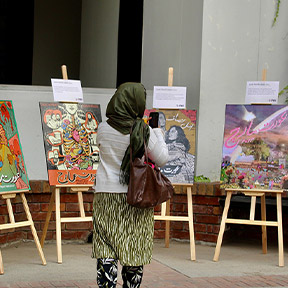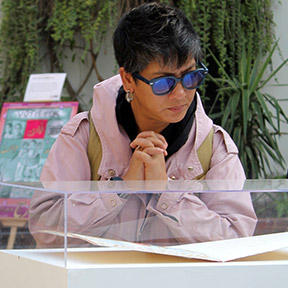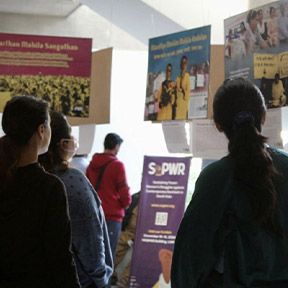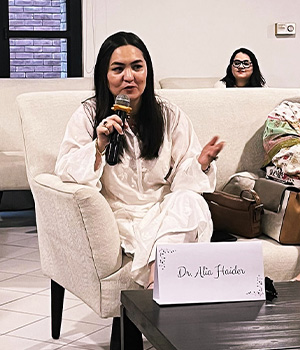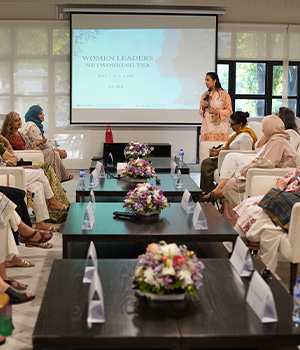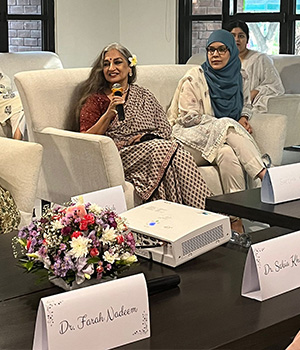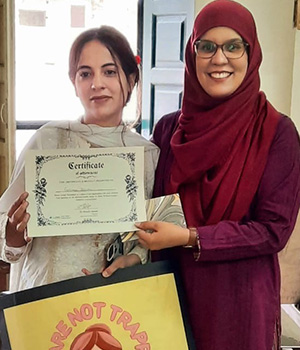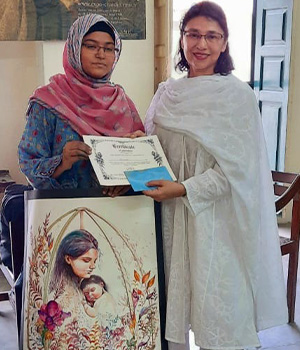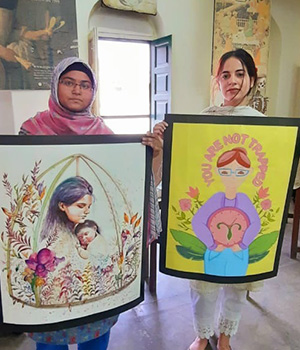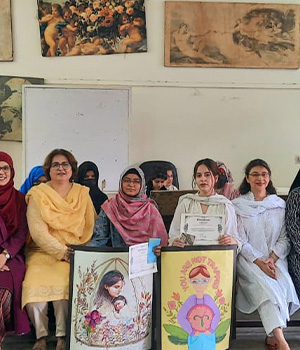Collaborations
The Sustaining Power: Women’s Struggles Against Contemporary Backlash in South Asia (SuPWR) Exhibition took place from December 16-18th 2024 in Lahore. The exhibition was held as part of the Sustaining Power: Women’s Struggles Against Contemporary Backlash in South Asia project, an ESRC-funded collaborative research project encompassing Bangladesh, India, Nepal, and Pakistan and conducted over a span of five years. The SuPWR Pakistan team is led by the Institute of Development & Economic Alternatives (IDEAS).
The SuPWR Exhibition was organized by IDEAS in collaboration with the Saida Waheed Gender Initiative (SWGI) and Mahbub-ul-Haq Research Centre (MHRC) at the Lahore University of Management Sciences (LUMS) and the Institute of Development Studies, Sussex. It was a key contribution to the Pathways to Development Conference 2024. The immersive multi-country exhibition was displayed throughout the corridors and central courtyard of the Mushtaq Ahmad Gurmani School of Humanities and Social Sciences (MGHSS) building at LUMS.
The artworks and imagery explored the core question of the SuPWR project: when, how, and why women’s power struggles succeed in retaining power and sustaining their gains against backlash.
Exploring Women’s Political Struggles Through Art
The exhibit showcased art and imagery that centered the voices of 16 women’s and feminist rights movements from Bangladesh, Nepal, India, and Pakistan, highlighting their multifaceted struggles and successes amid growing anti-gender backlash. Visitors and participants were invited to explore a diverse array of interactive and thought-provoking exhibits, including digital stories, documentaries, and original artworks, offering an immersive experience of women’s struggles in South Asia. The exhibition provided a unique opportunity to deepen understanding and engage with the rich stories of women’s activism in the region.
On Friday, 17 May 2024 the Saida Waheed Gender Initiative (SWGI) and the Chaudhry Nazar Muhammad Department of Economics (Economics Department) at LUMS held a Networking Tea for Women Leaders. Women professionals from across various industries were invited to come together through this platform. This included but was not limited to, academics, researchers, artists, doctors, women in public service, journalists, practitioners from NGOs. Through this event, we aimed to platform and acknowledge the achievements of these women leaders and learn from their journeys. Together, not only did we share our stories and struggles but also got to know each other and had the opportunity to network and build connections. We facilitated creation of a space where conversation was encouraged and free flowing.
Three brilliant women leaders were invited to open the event with their stories, and we are deeply grateful for their grace, honesty, and vulnerability. Ms. Sheema Kermani was our first speaker. Ms. Kermani is a classical dancer and activist who founded the women’s organisation Tehreek-e-Niswan. Sheema spoke about the centrality of the exploitation of women’s bodies in a patriarchal society and how she found dance to be a liberatory practice. Dance not only provided her the opportunity to connect with herself and move beyond patriarchal beliefs imposed on her body. Art is a great way to connect beyond the limitations of words and an active way to resist to repression, said Ms. Kermani. She shared, how she has had to grapple with discriminatory attitudes due to her profession. This discrimination rooted in patriarchal beliefs of controlling women’s bodies affected her, but she found her practice of dance liberated her and helped her navigate and ultimately defeat the shame imposed on her by patriarchy.
Our second speaker was Ms. Nighat Dad, who is the founder and director of the Digital Rights Foundation. A lawyer by profession, Nighat is a powerhouse who has had to push through and make space for herself in one of the most challenging professions for women. Ms. Dad shared how when she started out as a lawyer, she could see that the legal profession was hegemonized by men and women lawyers were often treated with disregard. Mentoring opportunities were far and few, and women lawyers were kept away from gaining crucial court experience and treated like secretaries who were meant to run the office. As she continued in the legal profession digital rights became something she wanted to focus on especially seeing the immense digital divide not only across genders but also classes. Using her savings accumulated over time she set out to create the Digital Rights Foundation. Now the organisation is one of the key places where survivors of online and technology facilitated gender-based violence are guided about their rights and helped through their experiences.
Our third speaker was Dr Alia Haider who is public health and climate justice advocate and humanitarian from the Hazara community in Balochistan, Pakistan. Dr Haider was at the forefront of organising medical camps in the devastating flood of 2022 in Pakistan, providing vital healthcare, clean water, and other supplies to affected communities in Sindh, Balochistan, and Khyber Pakhtunkhwa. Since 2018, Dr Haider has also established free medical camps in underserved and marginalized communities. Dr Alia spoke about how it was immensely important for her to use her profession to push for change and work for the most marginalised communities.
SWGI has been formally engaging with the students at the Naqsh School of Arts situated in Baazar-e-Hakima in the Walled City. The school situated in Syed Babar Ali’s natal home and run by Ms Afroza Sarmad Khan has been serving as a space where folks from within the surrounding vicinity can come and learn skills through different art programmes. There is painting, illustration, ceramics, pottery, etc. Their artwork is available for purchase at the Naqsh Gallery in Packages as well as at the site of the school.
We not only want to platform their fantastic skills in LUMS but also want to use these interactions to talk about how art is integral in depicting social and political life. For the first round we spoke to a few children and discussed the theme of women’s health specifically maternal health. We spoke about the care work mother’s do and how often their health is neglected in the process. How women become especially precarious during pregnancy and childbirth. We didn’t impose any rigid boundaries on the students and left it to them to decide how they want to work with this theme.
Two students shared their fantastic artwork with us and received a certificate as well as a small cash prize. The first painting is by Amna who depicts the love shared between mother and child, but also how motherhood can become a cage due to societal norms and impositions. The second painting is by Fatima Bilal, her idea erupts from the story of a woman in her neighbourhood who gave birth to five children without any significant gap. Fatima wanted her work to speak to the pressure imposed on women through the allegory of the biological clock.

